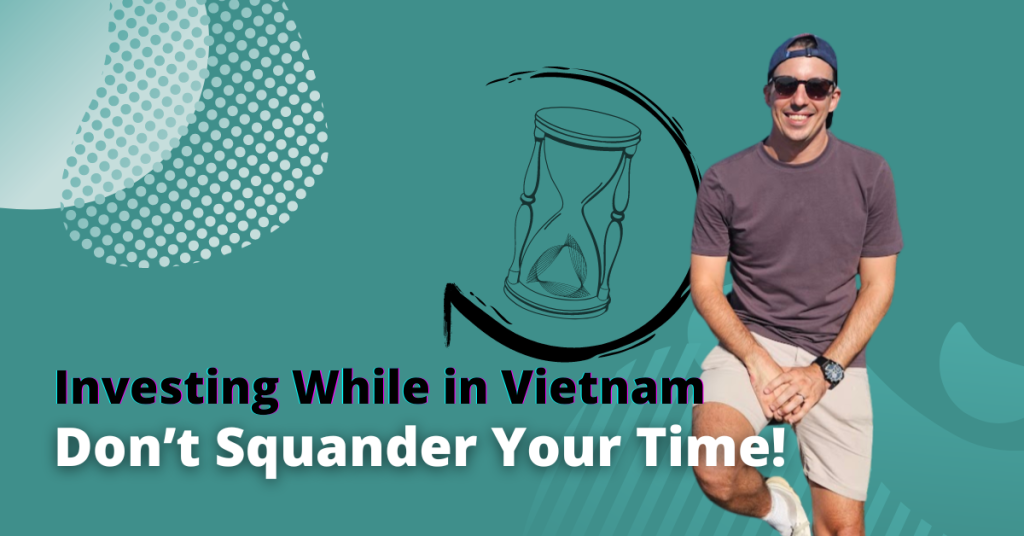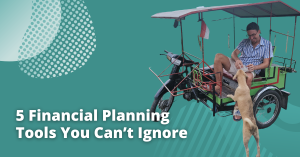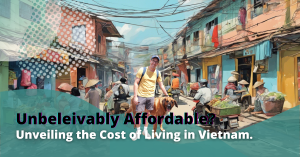I know from experience that investing can seem like a daunting task. First, you have to learn about investing in general, then specifically how to invest and what to invest in. You also have to consider risk, ease of use of investment platforms, taxes and costs.
Investing while in Vietnam as an expat is even harder. In addition to all the standard considerations you also have to navigate political risk, so-called “independent” financial advisors that don’t have your best interest at heart, costly financial products, online brokerages and Vietnam’s fickle regulatory landscape.
It’s a mouthful, to say the least. And, the brainpower it takes to navigate retirement planning in Vietnam puts most people off it forever. I should know, I’ve helped enough people overcome that specific hurdle!
This guide will hopefully help you as an expat consider investing while in Vietnam, and keep these vital years from affecting your future financial success.
Introduction to investing as an expat
Living abroad can offer a wealth of opportunities, not just in terms of cultural experiences and career growth, but also in terms of financial gain. Often, expats make a good salary and if you’re investing while in Vietnam, for example, your cost of living will also be reasonably low meaning you may have more to invest. This allows you to do more for your financial future than you otherwise could in your home country.
While building real wealth through investing can be a complex process, the essence of wealth accumulation can be distilled into a surprisingly straightforward strategy: start investing early and continue investing regularly.
When you’re investing as an expat you largely have to do it yourself. This is because we often don’t receive corporate pension plans with contribution matching, don’t get access to 401ks (or your home country’s equivalent), nor do we get access to tax-advantaged accounts such as IRAs or ISAs.
What we expats do have on our side, however, is time. Time and money, however little, can lead to great wealth accumulation through the power of compound interest and exponential growth. Starting early enhances this effect, providing a longer timeline for investments to grow, and significantly increasing the potential for wealth accumulation.
Idea of Investing Giving you a Headache?
If it seems like a lot, it’s because it kind of is. You can definitely do it yourself(!) but if needed I’m here to walk you through it. Book a coaching session or two and you’ll see how quickly you get the hang of your finances.
Investing while in Vietnam?
So, why consider investing while in Vietnam? Well, the answer is simple. You have to.
If you are in Vietnam, or any other expat destination, for more than a couple of years, the years themselves will be important to your future financial success. As I mentioned above, no one else is going to help you and delaying your investment start date will only work to limit the time compound interest has to significantly increase your overall investments.
There are, however, other reasons you should not put off investing while in Vietnam and these are:
Understanding the importance of early investments
- Compounding Growth: The earlier you start investing, the more time your money has to grow through compounding. For example, if you invest $500/month for 25 years with an average annual return of 8%, you would have ~$476,000. If, however, you started investing $500/month 5 years later, you would only have ~$295,000 after 20 years. That’s a ~$180k loss due to a 5-year delay.
- Mitigating Risk Through Time: Investing early also provides a longer timeframe to ride out the volatility of the markets. If you invested in the S&P500 between 1929-2023, the probability of negative returns drastically reduced from 25% to 6% when comparing a 1-year investment to a 10-year investment, respectively.
- Building a Habit of Saving and Investing: Financial success comes down to habits and investing a little every month is one of the best financial habits you can cultivate. Regularly investing a portion of your income, however small, will set you on the path for financial success.
- Achieving Financial Goals Sooner: Whether it’s buying a home, starting a business, or ensuring a comfortable retirement, early investments can help you reach your financial goals sooner. Why put off financial security when you don’t have to?
- Maximising Retirement Savings: Not just retiring, but retiring comfortably is for most the ultimate goal. Through early investments, your money will better weather the change in environments, variability of stocks and allow you to dictate your own retirement. Why rely on an ever-increasing age of retirement when you can secure your own financial freedom?
How to start investing in Vietnam as an Expat
Starting your investment journey in Vietnam may seem daunting at first, but with the right guidance, information and a bit of patience, you will most definitely be rewarded. I guarantee it.
However, managing your own investments can be a bit more complex when living abroad, due to factors like currency risk and market access. To combat this, I recommend you take a deeper look into the following aspects of investing when you start investing as an expat. Knowing what you should consider and what you should avoid is the perfect place for beginner investors to start.
Consider Investing In:
- Online brokerages: Provides accessibility, variety and low cost. With online brokerages, you can retain access to your investment account anywhere in the world and have access to the likes of ETFs, stocks and bonds.
- Exchange-traded funds (ETFs): ETFs are a bundled investment product that offers instant diversification and flexibility. Any expat investor should consider ETFs as their go-to investment.
- High-yield saving accounts (HYSA): When in doubt, go the HYSA route. HYSAs will allow you to do something with your money other than keep it sitting in your bank account. Idle cash, outside of day-to-day funds, is the worst. If you’re not investing, at least pop your money into a high-yield savings account to gain some interest.
- Overseas Government Bonds: Depending on your country of nationality you may have access to your home country’s government bonds. Similar to HYSAs, bonds can offer a great return on investment when you are still too green to invest. Bonds are also a great way to stabilise any investment portfolio and lower overall risk.
Avoid:
- “Independent” financial advisors: “Independent” financial advisors in Southeast Asia are rarely independent. Usually, they are restricted which means that they can only offer certain products from certain providers from whom they receive large commissions at your expense. Due to this and the subsequent poor financial advice given, commission-based financial advice has been made illegal in more developed regions due to its inherent bias and cause for conflict of interest. Unfortunately, such practices are still common throughout SEA.
- Financial products pushed by banks: Whether it be their own funds, CDs, insurance or investment products, any investment plan or policy offered by banks should be avoided. They may be a convenient way to invest, but the products will cost you an incredible amount of money over time through fees and poor investment performance.
- Investment-linked products (ILPs): ILPs are the devil in disguise. These are any products that bundle investments and insurance (life or health). They may seem attractive, but avoid them at all cost. The fees usually accumulate to >50% of your first 4 years of contributions, which can range anywhere from $5,000-$10,000. Furthermore, the underlying investments never perform as well as market expectations and the insurance costs are always sky-high.
- Stock picking: Very fun and interesting, but also incredibly risky. At the end of the day, most of us have no idea what companies will perform well and investing directly in stocks can be a recipe for disaster. One slip can significantly inhibit investment returns for long periods. If, however, you do want to invest in a few companies, even out your portfolio by also including a majority share of diversified ETFs.
Investing while in Vietnam or as an expat requires careful consideration of all the unique challenges faced when living abroad. While online brokerages, ETFs, high yield savings accounts, and overseas government bonds offer accessible and diversified investment avenues, it’s crucial to be cautious of investment strategies that carry higher fees, complex terms, or lack transparency. Risk management should always be at the forefront of anything you do when it comes to your finances. And, always seek professional advice.
Still Confused?
Don’t worry, you’re not alone. After having consulted with people aged 23 through 66 I can confidently report that schools have let us all down. If you want a quick chat, you can book a free consultation below and we’ll see what we can do to get you rolling!
The Rise of Vietnam’s Economy in 2024: Investing in Vietnam
A lot of people talk about investing in Vietnam itself. I mean, with the rise of Vietnam’s economy and a few years of incredible economic market growth it does seem like an incredible idea.
Furthermore, with a population of ~100 million, a young workforce, an ever-increasing middle class, a strategic location in Southeast Asia and an average 5.83% annual GDP growth from 2010 to 2023 it has all the features of an emerging market worth investing in.
And, many companies agree. Over the last decade, foreign direct investment (FDI) in Vietnam has surged. In 2023 alone, FDI in Vietnam reached over $36 billion which was a 32% increase from the year before.
So why shouldn’t you invest in Vietnam?
Well, while investing in the entirety of the Vietnam stock market, through a VN50 or VN100 ETF, might not be too risky, anyone who has lived in Vietnam knows that reliable information can be spotty, to say the least. Unreliable information can severely affect an investment since while a company may look solid on the books, the truth may not be as it seems.
For example, last year Vietnam faced its largest corruption scandal ever where the chairperson of a real-estate developer, and majority stakeholder of Saigon Commercial Bank successfully embezzled over USD $12 billion (the equivalent of >3% Vietnam’s GDP).
It was subsequently rumoured that the culprits had bribed investigators for numerous years, getting them to overlook financial discrepancies. This makes you question that if such things can happen on such a large scale, it’s hard to trust that it isn’t occurring within other companies.
Further risks associated with investing in Vietnam
Individuals interested in exploring investment opportunities in Vietnam should be aware of a few other associated high risks that can drastically affect not just the performance of stocks, but also the access you have to your money. These include:
- Political Risks: The political landscape in Vietnam can flip on a dime. Predictability is definitely not a term that would be used when speaking of the country’s politics and investment stability is tied to politics whether we want it to or not. I don’t think Vietnam will make moves similar to Russia or China on a global scale, but domestic politics heavily influence company operations in the country.
- Regulatory Variability: Fluctuating financial regulations majorly complicate the process of transferring funds into and out of the country, eligible investment opportunities and the reliability of financial transactions. Not only do regulations change, the interpretation of regulations is always up for debate depending on the front-facing corporation, bank or investment company. When it comes to your money, the last thing you should want is regulatory discrepancies.
- Challenges in Direct Investment: Directly investing in the Vietnamese stock market poses significant difficulties for expats due to operational hurdles that must be cleared.
If you’re still keen on investing in Vietnam, a prudent approach would be to consider Vietnam ETFs (Exchange-Traded Funds). These ETFs are listed on international stock exchanges, offering a more accessible and potentially safer way to invest in the Vietnamese stock market. This method mitigates some of the direct risks associated with the local investment landscape while still providing you with exposure to Vietnam’s economic potential.
Like any investment though, investing in Vietnam comes with its own risks. Always consider diversifying any investments between geographical regions, sectors, industries and asset classes.
Don’t worry, you’ve got this
Ultimately, if you are an expat, investing while in Vietnam should not be forgotten and cannot be ignored and while getting started is not the easiest, it doesn’t have to be feared. Speak to a professional if you have to and increase your financial IQ by reading about online brokerages, simple ETF portfolios and high-yield savings accounts.
Approach your personal finances and investing with the mindset of “I’m spending a little time now so I don’t have to stress about my financial future later”. Remember though, that by investing you are putting your money at risk. Investments should never be attempted to get rich quick or without having enough emergency funds to tie you over if something bad happens. Be safe. You’ve got this!


